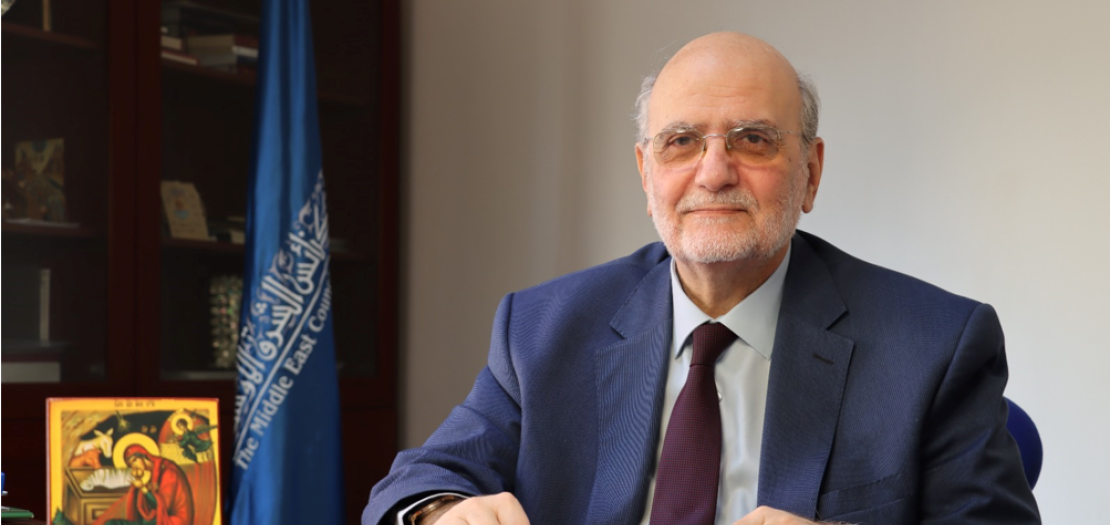Issued by the Catholic Center for Studies and Media - Jordan. Editor-in-chief Fr. Rif'at Bader - موقع أبونا abouna.org

There is no doubt that the contradictions that we witness on a daily basis in the modern world pose a challenge to any person in terms of the values he was raised with, which he was proud of, and which determined the course of his life.
The transformations that began with the Industrial Revolution and the emergence of the modern colonial era are still ravaging humanity with great momentum, and the changes that dominate our lives on a daily basis are too fast and powerful for humans to understand or be able to adapt to.
Man in modernity today destroys what he built yesterday, citing the necessity of change, not caring about what this does to his values, his psychological stability, his harmony with his surroundings, and his future. Man in modernity no longer lives under any control, to the point that it appears as if he has lost his reference and the parameters of his life.
Riding on the machine and its derivatives, he is sweeping the globe in search of natural resources or new markets. On his way, he is destroying whatever societies and civilizations he can find, and displacing or annihilating peoples.
At the same time, we read writings and principles produced by modern people that stimulate the conscience, distributing values left and right to the peoples of the world, to the point that you almost ask yourself: Is it the same person who did this and that?
Urbanization, has led to man's alienation from his brotherhood, and transformed human relations into impersonal, anonymous relations between unknown people, who do not know each other except through their interests. This has led to the unbridled ego taking precedence over everything else in human identity, and has produced the privacy that modern society keeps singing about.
But we ask, where has this privacy become in the face of social media’s invasion of people’s lives and privacy?
Humanity today faces an electronic information system that takes its breath away. If someone says that all we have to do is withdraw from this system, then some answer him that whoever leaves it becomes outside society and history, because it confiscated all social relations and interests, and reorganized them in its own way, in a way that makes the person in a state of complete dependence on it, either by encouragement, by facilitating his life, or through intimidation, by isolating a person or confining him to his needs if he “rebels” against them.
Statistics on the acquisition of electronic devices that people use in their daily lives have shown a rapid increase in the size of the market for these devices and the number of their users. The culture of social media has entered our lives, dominated our culture, and become an integral part of our daily lives. Even those who do not have to use it, find it familiar, know its potential, and talk about it even if they are not good at using it.
The contradiction is clear, then, between the values of privacy that modern societies consider to be one of their most essential components, and the complete invasion of this privacy represented by information systems, despite its necessity. The sarcastic story about Google when someone orders food and finds that the global information system even knows his rate of cholesterol, it advises him of food that will not harm him.
Many have heard or read about the project to implant an electronic chip in the human body, summarizing all the elements of his identity, including health. Tomorrow we may see it soon.
On the other hand, the values of modernity oppress the family, marginalize it, and prevent it from fulfilling its distinctive historical role, through which humanity has continued for thousands of years. When there was a return to the family in the nineties of the last century, researchers, thinkers, parties, and unions moved against this trend, and wrote articles denouncing the return of the family to its role, considering that this plays against equal opportunities among people, at a time when the family played a role that the state was absent from, and the equal opportunities among people declined significantly.
As for the argument about productivity, which I call the productivity war, it has occupied the largest part of economics literature and quantitative economics research for the past decades, and this productivity has become a Darwinian socio-economic tool that removes from the arena of production those who cannot secure a high percentage of it, and throws them into the unemployment market. The greatest irony in this context is that those in employment pay the taxes that finance unemployment compensation, even for a short period, before the unemployed become socially marginal, and thus they fall prey to various types of calamities and diseases.
In a parallel line, the target of economic efficiency comes to make matters worse, and cures the greed of huge production facilities, which do not hesitate to take any measure, acceptable or unacceptable, moral or immoral, to raise their productive effectiveness and therefore their profitability. In this frenetic race, the consumer, in his economic and sometimes health condition, is the prey of greed that has been plaguing companies since the Industrial Revolution, and its effects have not yet ended. The low quality of goods, to the point of physical harm to the consumer, is the best method, and the law of decreasing moral limit (loi de la morale limite décroissante), in the field of social responsibility of the establishment, is evidence of this.
All of this brings modern society into an unbridled materialistic culture that does not back down from anything to secure the interests of those in charge of things.
This is accompanied by the emergence and rise of the consumer society (consumerism), which has greatly increased human consumption needs, and has led to various harms, the first of which is man’s dependency on the credit system and his submission to the banking system, and then his enslavement by the installment purchase system, which has been reflected on his psychology and independence. The second is the damage to the environment to the point that some sociologists invented a branch they called sociology of the garbage can (sociologie de la poubelle), which shows the complexity of modern man’s life and his misery in his well-being.
On a more comprehensive level, we must stop at the social protection systems and their level in the West, during the period of the existence of socialist systems, and how they turned into systems with low effectiveness after that.
The insightful observer is sure how the collapse of the socialist system - and there is no way to stop the harm it inflicted on its people - was accompanied by the decline of social safety nets in modern countries, and the social policy currently followed in France, for example, but not limited to it, and other modern countries, is nothing but conclusive evidence. On that. At the same time, the decline of socialist regimes was accompanied by social class cleavages at the global level, clearly demonstrated by global statistics since 1991. All of this, if anything, indicates the hypocrisy of ultra-liberal regimes, and the pounce of those in power on the vulnerable groups in society. In this context, the rise of entrepreneurship represented a savior for free regimes and helped preserve the middle class, but the specter of economic concentration that leads to monopoly and the dominance of giant corporations, which increases in power with consolidation movements, remains perched on the chest of this rescue phenomenon formed by entrepreneurship.
I do not mean in my words that socialist systems were the solution, and they greatly harmed the societies that controlled their destinies for many decades, but they constituted an element of balance and challenge to unbridled liberalism, which, after its fall, did not hesitate to implement deadly social legislation and policies.
Economic freedom, like all freedoms, is necessary for progress, but it requires controls that adapt to the transformations in modern, rapidly dynamic societies.
As for what has recently arrived in the world of value inconsistency on the economic level, it is what is called today the corporate social responsibility - CSR.
The culture of social responsibility has presented itself as an alternative to social justice in liberal regimes with high abundance, but what do we expect from a phenomenon that began primarily from tax evasion by giant corporations, and has become a lecturer on virtue?
An American economist likens institutions that adopt social responsibility to be like a spoiled, corrupt child who discovers that the more he shows good behavior towards his family, the more money and other benefits he gains from them. However, he remains a corrupt, spoiled child, and the greatest example in our lives is represented by the Lebanese banks, which were putting their names on the bulletin boards of all cultural and humanitarian activities on the basis that it sponsors these activities, and which used to bombard us with slogans promising remedy to our problems, to the point that people began to consider them to be care institutions and not business institutions, until it became clear to the Lebanese that all these methods were only to beautify the image in order to attract the largest number of deposits in the framework of a high Ponzi scheme.
In all this winding path full of contradictions, the biggest victim remains the environment, as successive environmental summits show that it is nothing but a speck of ash in the eyes, and that there are no tangible results for their efforts in the foreseeable future. How do we expect results from summits concerned with the environment when they are funded by those who pollute it? It is savage capitalism that ravages the body of the earth and the body of humans, and there are no limits to its greed, which may destroy humanity.
Are there limits to human greed?
Just say to man, who in his daily concerns forgets the Creator and his brothers in creation, that “It is easier for a camel to go through the eye of a needle than for a rich man to enter into the kingdom of God.” (Mark 10:25)







